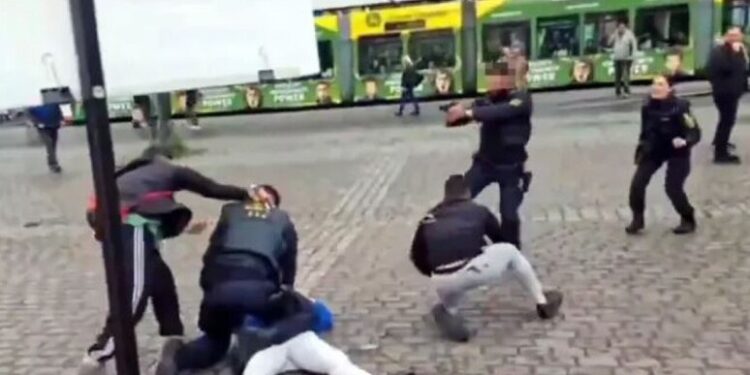Anti-Islam Politician Injured in Germany: Updates on Condition and Investigation: Michael Stürzenberger, the 59-year-old anti-Islam activist who was recently injured by the Mannheim stabber in Germany, is reported to be out of immediate danger according to his movement. The treasurer of Pax Europa, Stefanie Kizina, shared information with Bild, a German newspaper, stating that Stürzenberger was struck in the leg and face but is expected to undergo emergency surgery to address his injuries.
However, the situation takes a more critical turn for a policeman involved in the incident, as “security sources” cited by the Dpa agency have indicated that the officer is at risk of losing his life. Reports from Bild echo these concerns, revealing that the agent is currently undergoing an emergency operation in response to the severity of his injuries. The unfolding events have heightened anxieties about the safety and security of individuals engaged in public discourse and advocacy, underscoring the potential risks faced by those who challenge prevailing ideologies and beliefs.
The aftermath of the stabbing incident has left a total of six individuals injured, including five members of the “Pax Europa” civic movement and the policeman. The injuries sustained by those hospitalized are described as “partly serious,” as highlighted in a joint press release issued by the Karlsruhe Prosecutor’s Office, the Mannheim Police Headquarters, and the Baden-Württemberg State Criminal Office. The motive behind the attack remains murky, with the identity of the assailant currently undisclosed.
German Interior Minister Nancy Faeser, a member of the Social Democratic Party (SPD), condemned the violence and pledged to remain vigilant in response to the incident. Kizina echoed the sentiments of the Buergerbewegung Pax Europa (Pax Europa civic movement), asserting that the attack should be viewed as an act of terrorism rather than a random act of violence. Emphasizing the freedom to criticize religion as a core tenet of European Enlightenment values, Kizina underscored the importance of safeguarding intellectual discourse and dissent in societal debates.
Amidst the evolving narrative surrounding the attack on Stürzenberger and the subsequent injuries inflicted on others, the implications of the incident extend beyond individual harm to the broader discourse on freedom of expression, security protocols, and the boundaries of ideological confrontations in contemporary Europe. The repercussions of this disturbing event underscore the urgent need for dialogue, understanding, and a collective commitment to upholding democratic values while addressing the complexities of multicultural societies.
As investigations continue and details unfold regarding the circumstances leading up to the stabbing in Mannheim, the specter of political violence looms large, casting a shadow over the delicate fabric of public discourse and civic engagement. The incident serves as a sobering reminder of the fragility of peace and the responsibilities incumbent upon individuals and institutions to safeguard the democratic principles that underpin civil society.














































